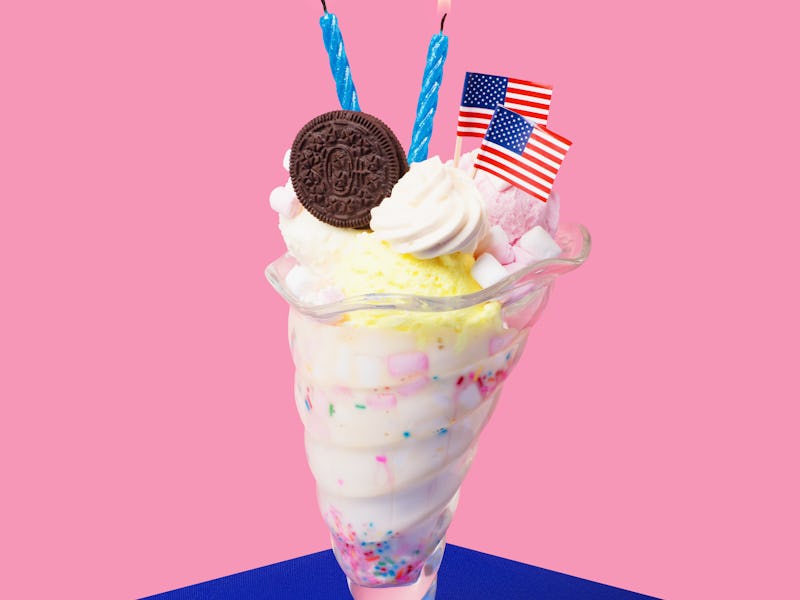How to bounce back from election stress eating, psychology experts explain
"I think that most people probably can sort of reset from last week without doing anything drastic."

Election week was long. In the interim between Tuesday evening's inconclusive election coverage and Saturday's declaration that Joe Biden had become the President-Elect, there wasn't much comfort to be found in America.
Unless you count comfort food.
From Tuesday onward, election-inspired stress eating became a demonstrable trend. The top "near me" searches on Google trends on Tuesday were "pizza, Chinese food, liquor stores, sushi, and Mexican food." Pizza parlors in LA saw orders surge 250 percent, The Los Angeles Times reported. Alcohol sales increased by 68 percent on average according to Drizzly, an alcohol delivery service.
No one was under any illusions about what kind of binge eating the country was partaking in. It was stress eating.
Stress eating is a way to attempt to soothe negative emotions, explains Chu-Hsiang Chang, a psychology professor at Michigan State University. It allows us to pair a pleasurable thing – like high-fat or sugary foods that delight the brain – with the uncomfortableness of an uncertain or stressful time.
Comfort foods do relieve stress in the short term, she tells Inverse. But the indulgent can also cause stress eating to become a pattern.
"[Stress-eating] can become a habit if people feel like this is an effective way to help them cope with the stress," Chang tells Inverse.
"This is particularly true if we stress eat food that brings us joy — sugar, fat, salt. And the temporary comfort brought on by these substances can mean that go back to the same behavior next time we experience stress."
The good news is that one week of indulgence likely isn't enough to set that pattern in motion. And individual bouts of stress eating can also be countered.
How to break bad eating habits
Getting back on track after a week of stress eating shouldn't be especially challenging because you may not be very far off track to start with, Charlotte Markey explains. Markey is a psychology professor and founder of the Food Sciences Center at Rutgers University.
"I'm very sympathetic to last week in particular," Markey tells Inverse. " I think everyone I know had too many carbs, too much alcohol. But I think the solution this week is to have a little bit less in terms of maybe carbohydrates or alcohol, but it doesn't mean to do anything more drastic than that."
Binge-eating for a week probably didn't lead to much (or any) weight gain. One 2019 study on eight men found that eating an additional 1,000 calories for five days wasn't enough to cause significant weight gain. But doing so for a month led to about 3 pounds of weight gain.
"I think that most people probably can sort of reset from last week without doing anything drastic."
Even during the holidays — a prolonged period of overeating — people only gain between 1 and 1.5 pounds, at least three studies have found.
Ultimately, a strange eating pattern from last week probably wasn't enough to allow you to develop a pattern of doing so regularly. Habit formation takes time – unless you're dealing with an addictive substance. One 2009 study on habit formation found that it took people between 18 and 254 days to cement a healthy habit, like drinking water at lunch.
"It seems that the habits that are easier to develop are not always the better ones," says Markey. "It's possible that some people started to develop habits last week. But you know they're not long term if they just lasted a week," she says.
That said, stressors themselves are perennial, even once elections are over — and Chang says there are ways to combat stress eating if the situation arises.
How to cope with stress eating when it happens – In 2017, Chang published a paper in The Journal of Applied Psychology, on the stress, sleep, and eating habits of 235 workers in China.
She found that when workers had stressful days, the workers tended to eat fewer healthy foods, and more junk food in the evenings, per their food diaries. But one thing that tended to blunt the effects of stress eating, she notes, was a good night's sleep beforehand. In the study, the authors describe sleep as a "protective factor."
If getting more sleep isn't an option, she suggests that it may be easier to replace a stress-eating habit than it is to break it altogether. That's not to say that stress eating doesn't decrease stressful feelings (studies have shown it does). It's just not the only thing that does so.
Chang notes that there are far more coping strategies out there to consider. Exercise, breathing techniques, or time outside have also been shown to reduce stress levels.
"Instead of training your brain and body to automatically grave for food and the comfort it brings, it will be important to train it to appreciate other coping strategies," Chang advises.
"The training to form new habit needs to happen during the less stressful times – so that it becomes part of your natural response."
That may mean picking up an entirely new host of exercise or eating habits. But it could also mean simply returning to the pre-election steady-state of life, or engaging in a limited amount of stress eating. A one-week deviation, either way, says Markey, isn't going to be enough to throw a balance out of whack.
"I think that most people probably can sort of reset from last week without doing anything drastic," she says.
This article was originally published on